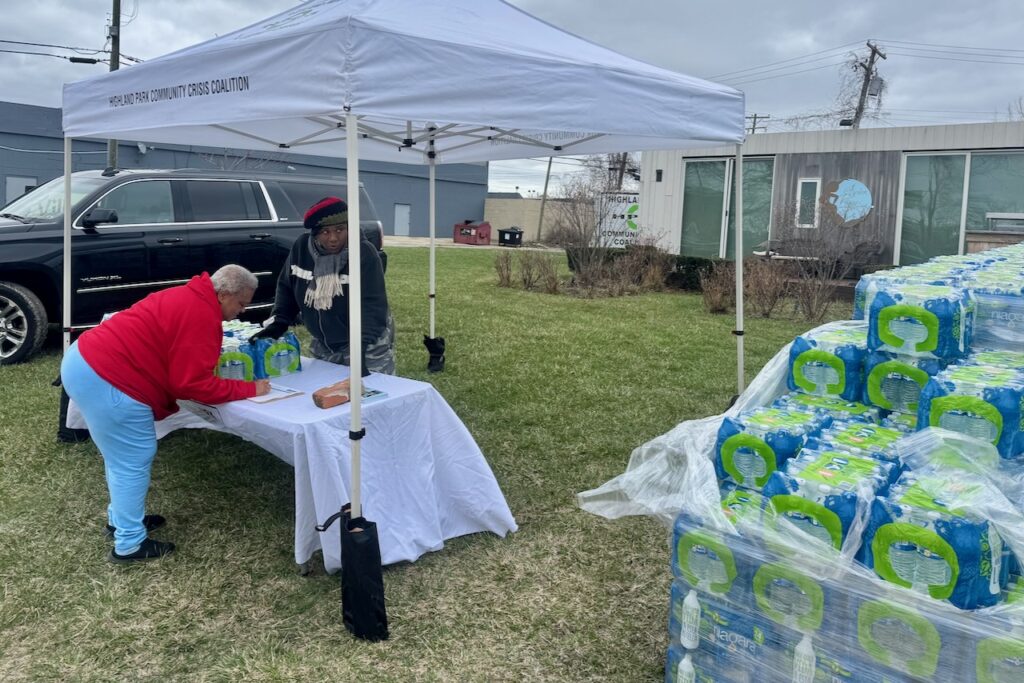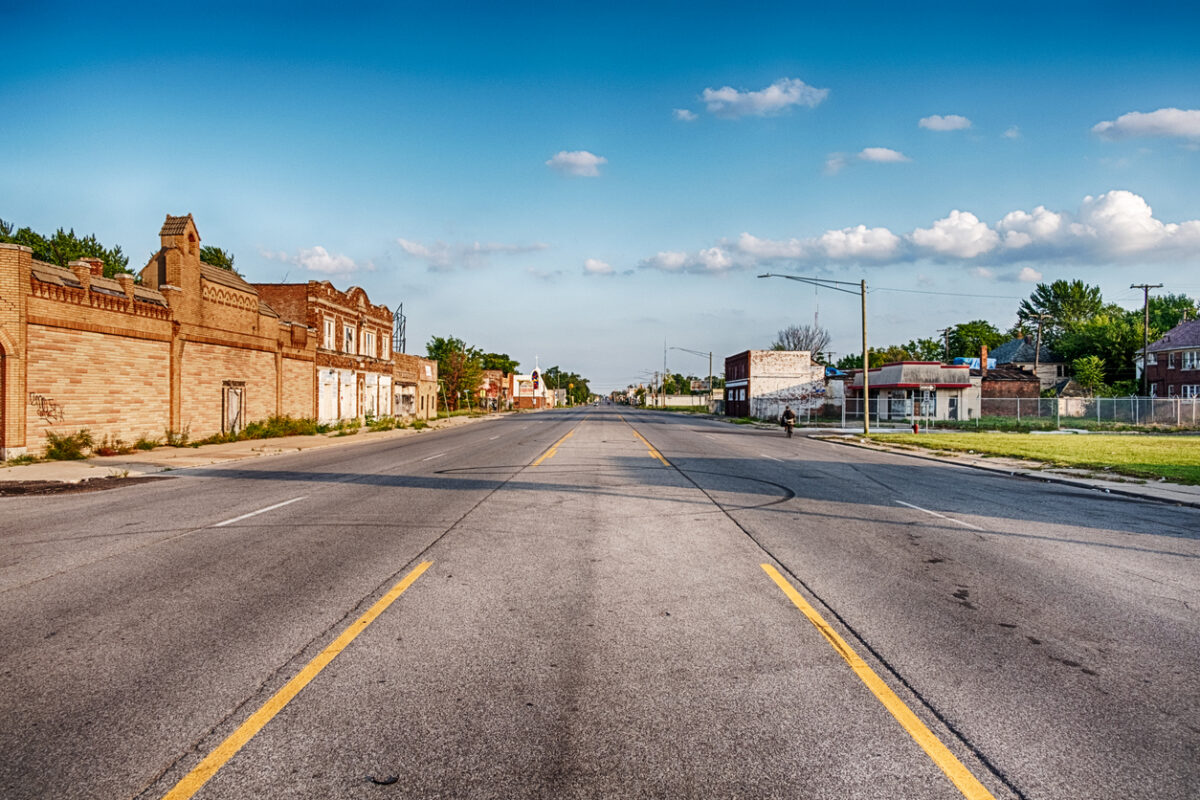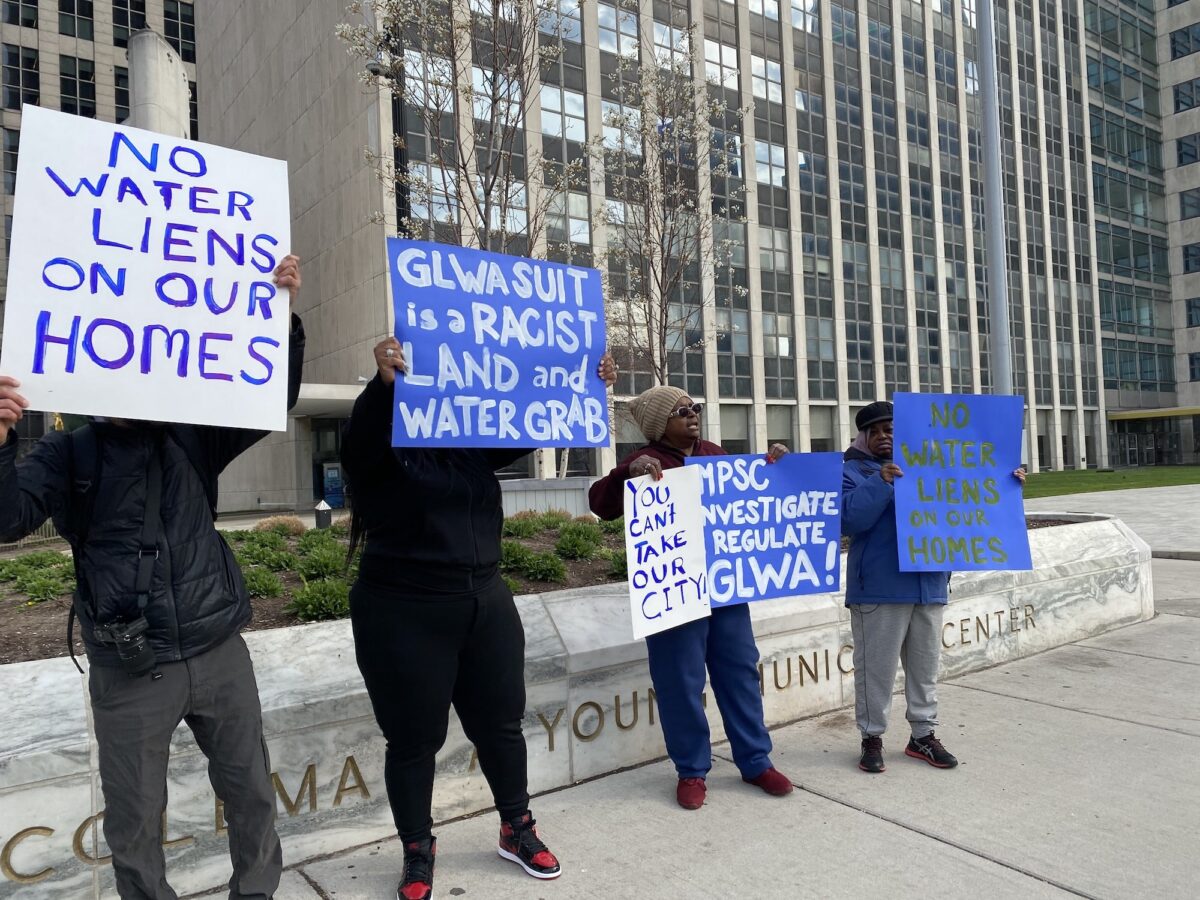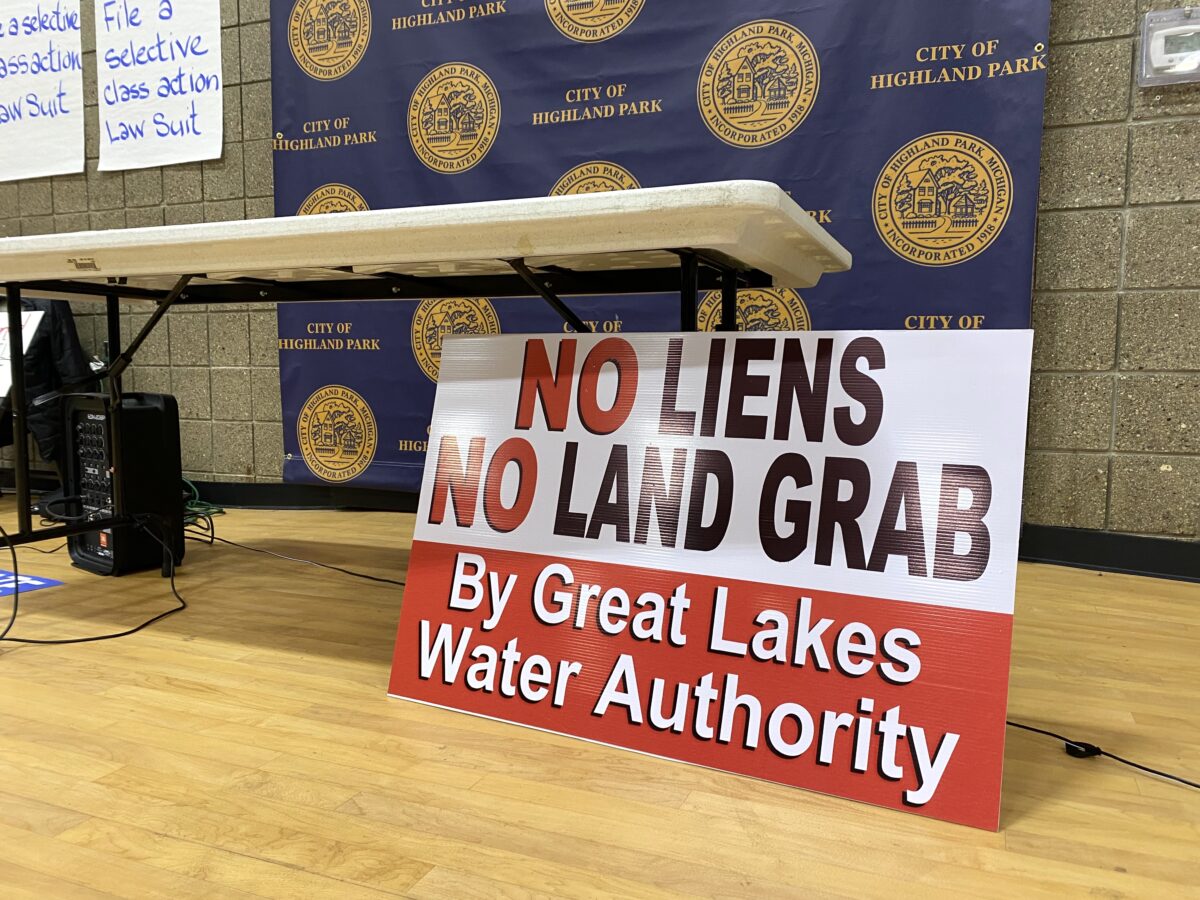Overview:
-Highland Park residents received a boil water notice for the second time in a month as the city overhauls its aging water infrastructure.
-Highland Park's replacement of its 115-year-old water distribution system follows a settlement agreement over water and sewage debt with the state and the Great Lakes Water Authority.
-"What about the people that don't have gas? What about the people that don't have electricity right now?" said Leon Morehead, pastor at New Grace Missionary Baptist Church.
Water pressure in the southwest and southeast portion of Highland Park dropped below the recommended state levels on March 29, prompting officials to put the city under a boil water notice until the issue could be resolved.
The advisory stretched for 10 days and was the second such occurrence in the last month.
“There have been a few other days like this, where the water pressure is very, very low,” Shamayim “Mama Shu” Harris, founder of Avalon Village and a member of the Highland Park Community Crisis Coalition, told Planet Detroit during a March 31 water distribution event.
Within an hour of setting up the distribution site, Harris and her staff greeted over a dozen families at Avalon Village, a three-block eco village on Avalon Street.
By day’s end, the team gave away roughly 600 cases of bottled water, sending city residents home with two to four cases at a time.
“Some people have no water trickling out. Some folks can’t take baths and showers. We’ve even had to pour water in the toilet, to make things run,” Harris said.
The latest boil water advisory was lifted Monday. For city officials, the advisory represents a blip in a citywide effort to replace aging elements of the city’s 115-year-old water distribution infrastructure.
For some residents, the weeklong boil water advisory compounded decades of social and economic pressures on Highland Park.
“Our water structures are outdated, and so things are failing and they need to be worked on,” Harris said. “We deserve water, and we got to have water.”
Highland Park water construction triggers advisories
Highland Park residents were hit with two boil water notices within the last month. The first water advisory occurred between March 4 and 7, while the second began on March 29 and lasted until April 7.
In both instances, water main breaks caused by a multiyear project to replace aging water main pipes, and service lines across the city contributed to drops in water pressure, according to Damon Garrett, director of Highland Park’s Water Department.
On average, Garrett said, Highland Park has roughly 30 water main leaks or breaks a year, largely due to the age of the city’s infrastructure. Those incidents do not result in low water pressure, he said, adding that the recent pace and frequency of construction projects underway across the city has stressed the system.
“Every time that we isolate a valve, or isolate a portion of main to make a repair, or isolate a portion of a main to perform construction, it forces the water to travel in a different direction,” Garrett said.
“Some of that might be through older pipes, and it may not allow the water to flow as freely because it’s going in different directions.”
‘We’re paying for something we cannot use’
While “tens of thousands of boil water advisories occur every year” across the country, the disruption they pose can be exponentially felt by economically depressed communities and cities with poorly maintained infrastructure, said Matthew Seeger, a communications professor at Wayne State University who has advised and studied public health crisis communication at the state and federal level for over 40 years.
“It compounds the harm when a community that has suffered like Highland Park … has to go through these kinds of circumstances,” he said.
With over 40% of Highland Park living in poverty, some residents and community leaders said more resources should have been given to people barely making ends meet.
Leon Morehead, lead pastor of New Grace Missionary Baptist Church, stopped by Avalon Village’s water distribution event on March 31 after he and his congregation delivered cases of bottled water to residents in the city’s two senior apartment complexes.
“It’s sad that this is the second time in less than a month where we have people now that are unable to flush toilets, people that are unable to have healthy drinking water, and here’s the thing, people are saying, you could just boil it, but what about the people that don’t have gas? What about the people that don’t have electricity right now?” Morehead said.
Highland Park resident Runae Ford said the advisory couldn’t have come at a worse time.
“It’s the end of the month,” Ford said. With neighbors and family members living on fixed incomes, and in light of rising water costs in recent years, Ford suggested that costs should be subsidized.
“At least do something about our water bill,” she said. “We’re paying for something we cannot use.”
Garrett said there are nonprofit programs, such as the Heat and Warmth Fund’s MI Water program and Wayne Metropolitan Community Action Agency’s Water Affordability Program, that can help residents pay their water bills.

A March 31 water distribution in Highland Park. Photo by Ethan Bakuli.
Why is Highland Park’s water service stumbling now?
Highland Park’s work to replace a 115-year-old water distribution system with modern infrastructure and technology is a result of a 2024 agreement between the state of Michigan, Highland Park, and the Great Lakes Water Authority to settle a decade-long dispute over unpaid water and sewage bills.
Under the agreement, the state agreed to cover the costs to install master water meters, temporary sewage meters, and replace water main and service lines. The city is estimated to lose roughly 70% of its water due to its poor infrastructure, according to the state.
Between 2018 and 2023, Highland Park repaired its water mains at a rate “of “3 to 5 miles of water main repair” per year, according to Garrett.
“Since 2023, we have ramped up the amount of miles,” he said. “Now we’re doing about 8 miles (annually). So we’ve doubled because we have a legal obligation to have all of the system repaired.”
In November, the Highland Park City Council unanimously approved a project to replace the city’s water meters with advanced digital models, increasing the efficacy and accuracy of water usage data and billing. Construction on the master meters began in February.
Simultaneously, Highland Park is replacing 6 miles of water main in the city’s southeast corner.
“We’ve never had this much construction in Highland Park at once, and so when you start opening and closing valves, and installing multiple miles of water main, this is what we’re up against,” Garrett said at a March 31 press conference.
What are boil water advisories?
Boil water advisories are mandated by the U.S. Environmental Protection Agency under the Public Notification Rule, which states that customers must be alerted whenever water fails to meet safe drinking standards or fails its task.
In situations where water pressure falls below the recommended level, it can cause contaminants to enter the water supply, putting residents at risk of illness and serious diseases.
“There are very rigid standards that water systems have to meet to be able to ensure the safety of the water that’s coming to people,” said Wayne State’s Seeger.
“These boil water advisories are precautionary norms based on the possibility that groundwater can infiltrate into the system.”
Boil water advisories are common in the Midwest due to the region’s freeze-thaw cycle and older infrastructure, Seeger said. When there is water system construction ongoing, such as in Highland Park, boil water advisories are likely, he said.
On average, most boil water advisories last anywhere from one to three days, Seeger said, adding that a week “is a long time for a boil water advisory.”
The optimal pressure range for a water distribution system is between 35 to 60 pounds per square inch, according to Highland Park’s Garrett. During Highland Park’s most recent boil water advisory, pressure levels fell below the state’s minimum requirement of 20 PSI across a functioning water system, he said.
“What we were seeing was 18, 19, I even think 15 (PSI) in certain cases,” Garrett said.
MORE REPORTING ON HIGHLAND PARK
What $10 million for drinking water infrastructure means for Highland Park
The money won’t impact the city’s water debt, but it could help the city address leaky pipes and lead.
State help may be on the way for Highland Park
Michigan’s proposed health department budget includes $20.3 million to pay off city water debt.
Judge denies stay, requires Highland Park and GLWA to reach water payment agreement
Highland Park official says GLWA decision could mean tax ‘catastrophe’ for residents and businesses.
City does not expect ongoing boil water advisories
The city’s three master meters are being installed at Hamilton Avenue and Webb Street; Hamilton Avenue and McNichols Road; and McNichols Road and John R Street.
Highland Park’s master meter project is set to wrap up toward the end of the summer, according to Garrett, at which point he said city residents will be “out of this unique scenario” and “back to some sense of normalcy.”
The city’s water director told Planet Detroit that he does not expect multiple boil water advisories during the next six years of construction.
“There might be some pressure fluctuations, but not anything that would send us into an advisory situation.”
As of this month, Garrett added, master meter construction at McNichols and Webb is at 60% completion, while McNichols and Hamilton is at 20%. Installation of a master meter at John R and McNichols will not start until the other projects are finished.
Wayne State’s Seeger said that as long as construction is ongoing, residents should expect boil water advisories.
“Hopefully they will be more contained and they won’t go on for an entire week,” he added.
How were residents informed?
City officials attempted to inform residents through its main website, text and email alerts, and TV appearances, Highland Park Mayor Glenda McDonald said at a March 31 press conference.
“We’ve used every outlet we can besides door to door,” McDonald said.
“I know it’s very inconvenient. I live in the same area. I am having the same issue. We have had to close down city hall, due to the fact that it’s in the same area. There’s not enough pressure to have toilets flushing and so we can’t have citizens in there.”
Seeger said that “engaging with the public, frequent communication, making information available in multiple channels, not just through a press release, providing specific guidance to people listening to their concerns, all of those are really helpful strategies.”
Morehead said the toughest challenge is keeping residents informed, now and in the future.
“For every group that knows of (the boil water advisory) through social media and newspapers, there’s a lot who don’t, and that’s a sad thing.”
Editor’s note: This story has been updated to correct the spelling of Highland Park resident Runae Ford’s name.





